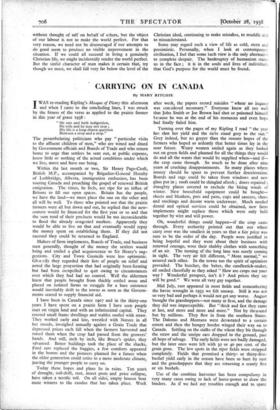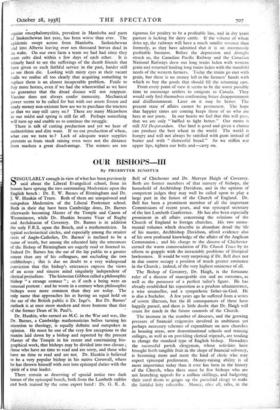CARRYING ON IN CANADA
By MARY RITCHIE
IWAS re-reading Kipling's Masque of Plenty this afternoon and when I came to the concluding lines, I was struck by the fitness of the verse as applied to the prairie farmer in this year of grace 1938 :
" He eats and hath indigestion, He toils and he may not stop ; His life is a long-drawn question Between a crop and a crop."
The perambulating politicians who pay " particular visits to the affluent children of men," who are wined and dined by Government officials and Boards of Trade and who return home to urge that settlers be sent out, at public expense, know little or nothing of the actual conditions under which we live, move and have our being.
Within the last month or two, Sir Henry Page-Croft, British M.P., accompanied by Brigadier-General Hornby of Lethbridge, Alberta, immigration enthusiast, has been touring Canada and preaching the gospel of renewed British emigration. The times, he feels, are ripe for an influx of Britons to fill our open spaces. Britain has the people, we have the land—we must place the one on the other and all will be well. To those who pointed out that the prairie farmers were all but down and out, he replied that the new- comers would be financed for the first year or so and that the sum total of their products would be too inconsiderable to flood the already congested markets. Apparently they would be able to live on that and eventually would repay the money spent on establishing them. If they did not succeed they could be returned to England.
Makers of farm implements, Boards of Trade, and business men generally, thought of the money the settlers would bring and smiled a glad acquiescence to Sir Henry's sug- gestions. City and Town Councils were less optimistic. Glco Inily they regarded their lists of people on relief and noted the large proportion that had originally been farming but had been compelled to quit owing to circumstances over which they had had no control. Well the aldermen knew that people brought from thickly settled areas and placed on isolated farms to struggle for a bare existence would inevitably drift to the towns as soon as the Govern- ments ceased to supply financial aid.
I have been in Canada since 1907 and in the thirty-one years I have spent on a prairie farm I have seen people start on virgin land and with an infinitesimal capital. They erected small frame dwellings and stables roofed with straw. They worked early and late, wrestled with Nature in all her moods, inveighed annually against a Grain Trade that depressed prices each fall when the farmers harvested and raised them when the crop had passed from the growers' hands. And still, inch by inch, like Bruce's spider, they advanced. Better buildings took the place of the shacks, Ford cars replaced the buggies, a few comforts appeared in the homes and the pioneers planned for a future when the older generation could retire to a more moderate climate, leaving the younger people to carry on.
Today these hopes and plans lie in ruins. Ten years of drought, soil-drift, rust, insect pests and price collapse, have taken a terrific toll. On all sidei, empty houses bear mute witness to the exodus that has taken place. Week after week, the papers record suicides " where no inquest was considered necessary." Everyone knew all too well that John Smith or Joe Brown had shot or poisoned himself tecause he was at the end of his resources and even hope had finally failed him.
Turning over the pages of my Kipling I read " the year has shot her yield and the ricks stand grey to the sun." Grey indeed, but no greyer than the roseate hopes of the farmers who hoped so ardently that better times lay in the near future. Weary women smiled again as they looked out on green fields and planned for all the things they would do and all the wants that would be supplied when—and if— the crop came through. So much to be done after nine years of crushing disappointments. So many places where money should be spent to prevent further deterioration. Boards and rags could be taken from windows and new glass put in ; roofs could be shingled afresh ; doors repaired ; draughty places covered to exclude the biting winds of winter. New household equipment could be bought— sheets and blankets, pots and pans, cups and saucers, shoes and stockings and decent warm underwear. Much needed dental and optical services could be obtained, new farm implements might replace those which were only held together by wire and will power.
Oh, wonderful things could happen—if the crop came through. Every authority pointed out that our wheat carry over was the smallest in years so that a fair price was sure to be the order of the day. People were justified in being hopeful and they went about their business with renewed courage, wore their shabby clothes with something of an air. The turning of the long lane was surely coming in sight. The very air felt different, " More normal," we assured each other. In the towns too the spirit of optimism prevailed. The butcher, the baker, the candlestick-maker, all smiled cheerfully as they asked " How are crops out your way ? Wonderful prospect, isn't it ? And prices they say will be good." We were all very gay together.
Mid July, rust appeared in most fields and remembering the havoc wrought in 1935 we felt uneasy. Still it was nit so very bad and perhaps it would not get any worse. August brought the grasshoppers—not many at first, and the damage they did was imperceptible. But " thick and fast they came at last, and more and more and more." Not by thcusand but by millions. They flew in from the southern States. The Dakotas and Montana were devastated to a certain extent and then the hungry hordes winged their way on to Canada. Settling on the stalks of the wheat they bit through the straw and the unripe ears dropped to the ground, past all hope of salvage. The early fields were not badly damaged, but the later ones were left with 3o or 4o per cent. of the grain gone. The low spots in the riper fields were stripped completely. Fields that promised a thirty- or thirty-five- bushel yield early in the season have been so hurt by rust and the grasshoppers that they are returning a scanty five or six bushels.
Use of the combine harvester has been compulsory in very many cases owing to lack of horse-power to draw the binders. As if we had not troubles enough and to spare equine encephalomyelitis, prevalent in Manitoba and parts of Saskatchewan last year, has been worse than ever. The epidemic swept across from Manitoba. Saskatchewan and into ,Alberta leaving over ten thousand horses dead in its wake. On our own farm a team we had had since they were colts died within a few days of each other.. It is bitterly hard to see the sufferings of the dumb friends that have given us such faithful service in the past, harder still to see them die. Looking with misty eyes at their vacant stalls we realise all too clearly that acquiring something to replace them is an almost insuperable problem. Futile to buy more horses, even if we had the wherewithal as we have no guarantee that the dread disease will not reappear. Vaccine does not always confer immunity. Mechanical power seems to be called for but with our assets frozen and ready money non-existent how are we to purchase the tractors so that we may still carry on? There are many Micawbers in our midst and spring is still far off. Perhaps something will turn up and enable us to continue the struggle.
There is talk of cutting production and yet we hear of malnutrition and dire want. If we cut production of wheat, what can we turn to ? Lack of adequate water supplies prevents us from stock raising even were not the distance from markets a great disadvantage. The winters are too rigorous for poultry to be a profitable line, and in dry years pasture is lacking for dairy cattle. If the volume of wheat dries up, the railways will have a much smaller revenue than formerly, as, they have admitted that it is an enormously profitable business. Before the depression and drought struck us, the Canadian Pacific Railway and the Canadian National Railways drew out long trains laden with western grain and returned hauling long trains laden with the manifold needs of the western farmers. Today the trains go east with grain, but there is no money left in the farmers' hands with which to buy the goods that should fill the returning cars.
From every point of view it seems to be the worst possible time to encourage settlers to emigrate to Canada. They would only find themselves confronting bitter disappointment and disillusionment. Later on it may be better. The present state of affairs cannot be permanent. The hope that happier times are coming keeps those of us who are here at our posts. In our hearts we feel that this will pass, that we are only " baffled to fight better." Our motto is still Nil Desperandum. Our land is good and given a chance can produce the best wheat in the world. The world is hungry and will not always be satisfied with guns instead of butter and with " distressful bread." So we stiffen oar upper lips, tighten our belts and—carry on.

























































 Previous page
Previous page